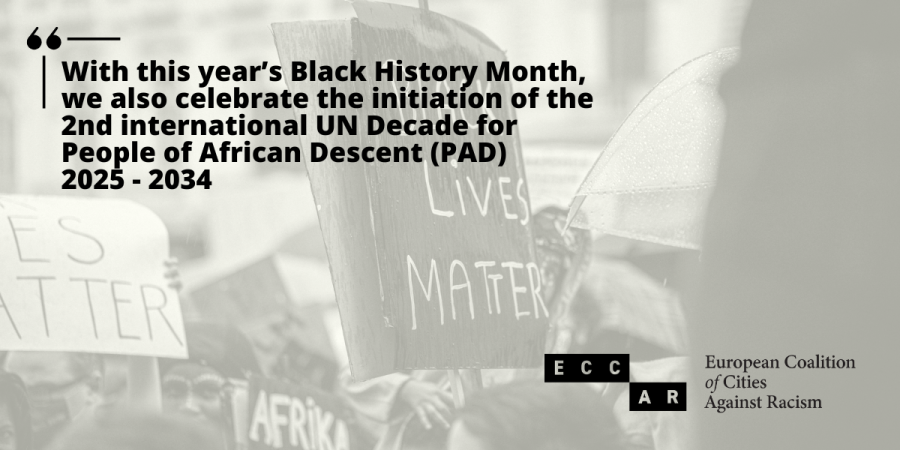
Black History Month
Black History Month (BHM) originated in the United States in 1915 with an idea by historian Carter G. Woodson. Together with minister Jesse E. Moorland, he founded what is known today as the Association for the Study of African American Life and History (ASALH). In February 1926, they sponsored the first [Black] History Week in connection with Frederick Douglas' birthday. The idea of Black History Week spread to various cities and became the Black History Month we know today, particularly due to the Civil Rights Movement of the 60s.
Today, Black History Month is much more than a US phenomenon. People all over the world celebrate and commemorate Black, African and Afro-diasporic history, culture and achievements, sometimes even under modified titles such as Black Story Month or Black OurStory Month. Every year, Black History Month continues to serve as a platform for promoting cultural awareness, combating racism, and fostering solidarity all across the world.
Second International Decade for People of African Descent (PAD)
This year, Black History Month also celebrates the start of the second international UN Decade for People of African Descent (PAD). The first Decade was proclaimed by the UN General Assembly in a Resolution (68/237) adopted on 23 December 2013. Under the theme of Recognition, Justice and Development, the Decade pursued various objectives from 2015 to 2024.
The resolution itself established the following specific national, regional and international objectives for the first Decade:
- To strengthen action and cooperation in relation to economic, social, cultural, civil and political rights by PAD and their equal participation in all aspects of society;
- To promote a greater knowledge of and respect for the diverse heritage, culture and contribution of PAD to the development of societies;
- To adopt and strengthen legal frameworks in accordance with the Durban Declaration & Programme of Action and the ICERD, and to ensure their full implementation.
A Second International Decade for People of African Descent from 2025 to 2034 was proclaimed on 17 December, 2024.
“The fight against racism and racial discrimination is far from over. It is a fight that must not wane but intensify because the vision of a world free from these pervasive scourges remains an urgent and moral imperative for all of us”, said June Soomer, The Chair of the Permanent Forum on People of African Descent (PFPAD).
While key outcomes of the first Decade include increased visibility of Afro-descendant issues, the establishment of the PFPAD, and the ongoing work on the UN declaration on the respect, protection and fulfilment of the human rights of people of African descent, much remains to be achieved, as Barbara Reynolds, Chair of the UN Working Group of Experts on People of African Descent (WGEPAD) pointed out.
The second decade reminds us and holds us accountable to take initiative and focus on collective action and systemic change.
ECCAR x Black History Month
Next to the UN Decade with many different focal points, ECCAR member cities are also being reminded of pillar 9 of the ECCAR's 10 Points Action Plan - ensuring fair representation and promoting diverse cultural expression and heritage in city life - that correlates to celebrating Black History Month. Many ECCAR member cities, such as Berlin, Hannover, Heidelberg, and Rome, have been active in the realization of Black History Month in their cities. However, it stays essential to approach corresponding activities collaboratively, engaging respectfully with Black communities and prioritizing their perspectives and narratives. Moreover, it is crucial that these initiatives are included in comprehensive strategies to combat anti-Black racism beyond Black History Month, fostering collaboration with communities to avoid tokenism and achieve structural long-lasting change.
Celebrating Black History Month in European cities is not only about recognizing European history in relation to anti-Black racism, but it is also an important step towards anti-racist action, setting an example and promoting human rights and social justice for everyone.
Working Group Meeting on Anti-Black Racism
In connection with the declaration of the second Decade and the start of Black History Month, another meeting of the working group on anti-Black racism took place on 31 January 2025.
In correlation and initiated by the cities of Heidelberg and Bologna in 2020, ECCAR's Working Group on Anti-Black Racism has been serving as a vital platform for peer-to- peer exchange and the sharing of local practices in countering anti-Black racism at the local level. Through the Working Group activities cities are provided with concrete support to implement the Decade and promote equitable participation where most Black people are at home - in the cities. It also aims to analyze local policies for fighting anti-Black racism, and discrimination to formulate concrete policy recommendations for cities.
A key measure in this context is the creation of a survey on local practices against anti-Black racism and related policy recommendations which will be published in 2025 and will be accompanied by webinars and further working group meetings throughout the process.
